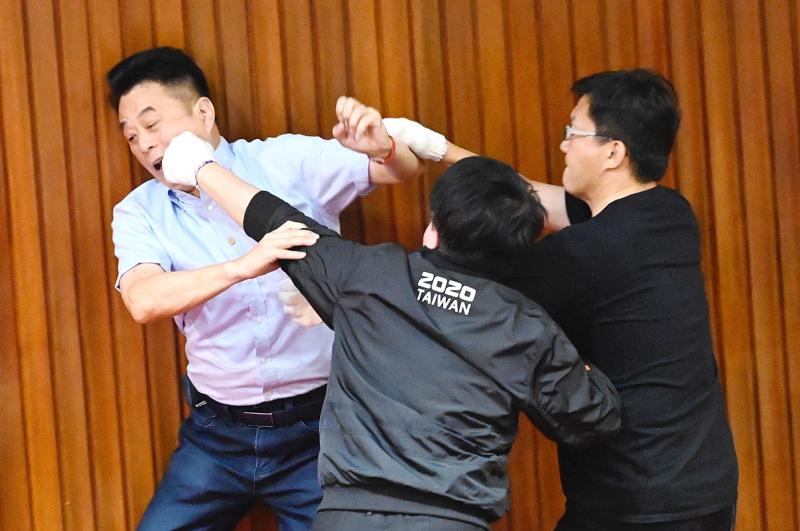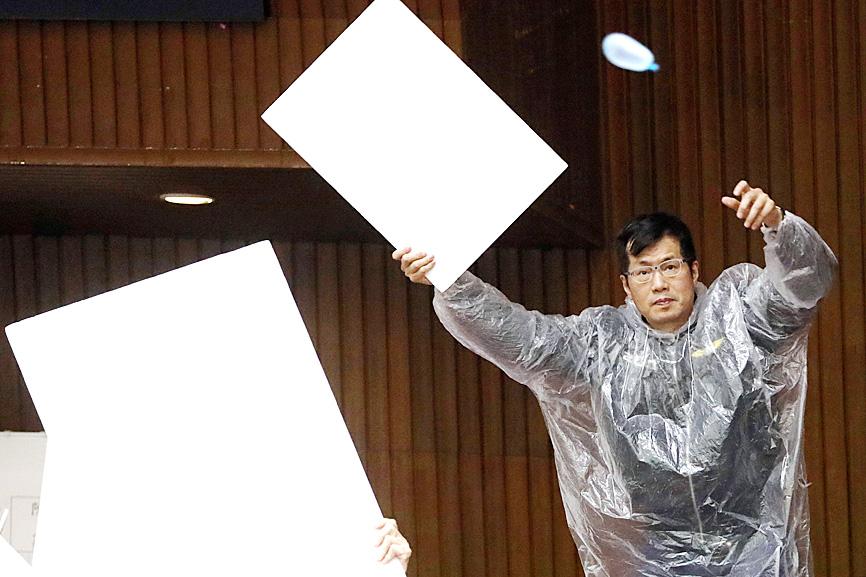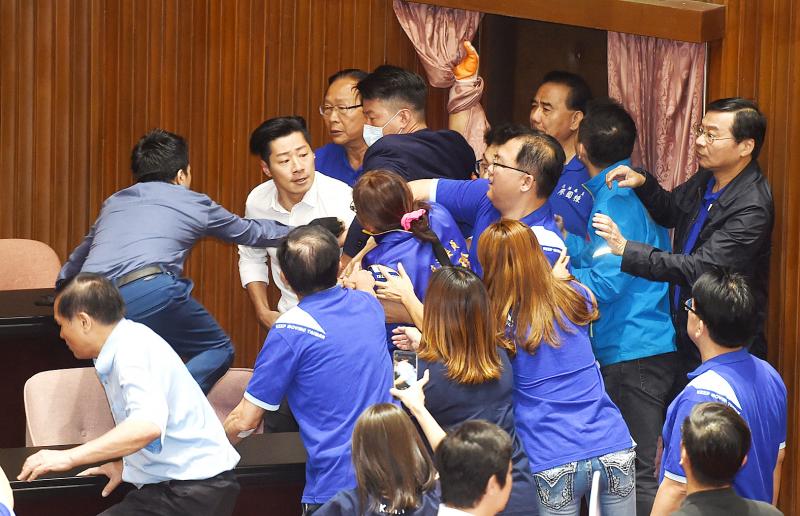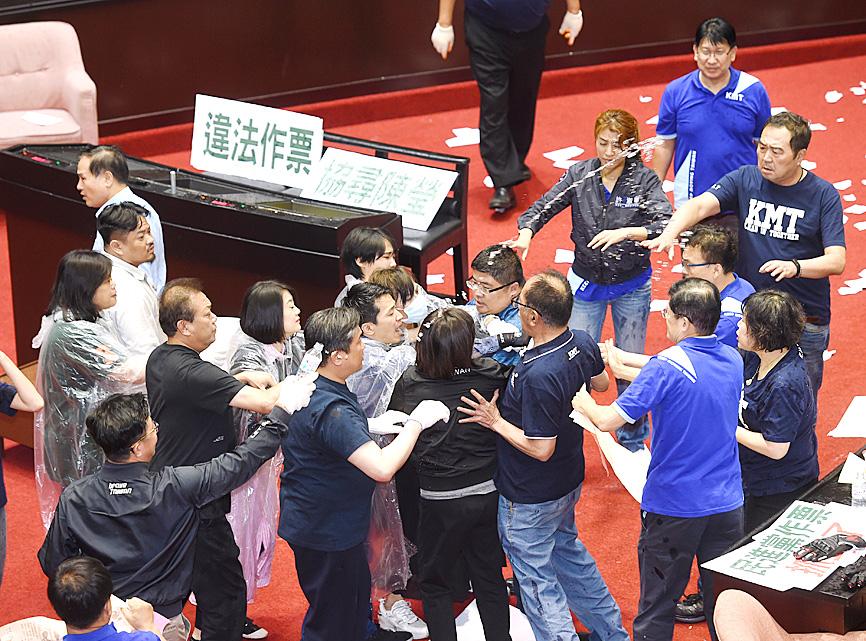Amid chaotic scenes, former Presidential Office secretary-general Chen Chu (陳菊) was yesterday approved as Control Yuan president, despite Chinese Nationalist Party (KMT) legislators attempting to disrupt the vote.
After Legislative Speaker You Si-kun (游錫堃) announced the start of a vote on the president’s Control Yuan nominees at the Legislative Yuan in Taipei, KMT legislators pushed over the two voting booths set up in the main chamber.
The move triggered a melee, but that did not stop DPP legislators from voting to approve the nominees, while KMT legislators attempted to obstruct the proceedings.

Photo: Sam Yeh, AFP
KMT caucus whip Lin Wei-chou (林為洲) said that there had been wrongdoing in Thursday’s vote on a motion that marked the end of a review of the nominees and set the rules for yesterday’s vote.
DPP Legislator Chen Ying (陳瑩) was at a TV station recording a political talk show when You put the motion to a vote, but her name lit up on a screen showing who had voted, indicating that someone else had voted for her, Lin said.
The result should have been annulled just as an election result would be voided if a candidate was found to have bought votes, he said.

Photo: Ann Wang, Reuters
After briefly leaving the main chamber, KMT legislators returned at 11:42am, just 18 minutes before the vote was scheduled to end, and demanded that they be handed ballots.
Legislative Yuan staffers provided a box for KMT legislators to cast their ballots, but they were determined to cast them on the opposite side of the chamber, which was guarded by DPP legislators.
The move alarmed the DPP legislators, who attempted to block their KMT counterparts, triggering scuffles.

Photo: Fang Pin-chao, Taipei Times
KMT lawmakers claimed that the bottom-right corner of every ballot had been cut out and that the vote was being rigged, while demanding that a booth be set up so that they could vote.
With just three minutes left before the vote ended, staffers scrambled to provide a voting booth, but it was set up too late for the KMT legislators to use.
When You ordered that the count begin, it was met with protests from KMT legislators, who threw balloons filled with water at the speaker’s rostrum, while DPP legislators surrounded You and shielded him with placards.

Photo: Fang Pin-chao, Taipei Times
Chen Chu’s nomination was approved 65-3, with two spoiled votes.
The 26 nominees for Control Yuan members were also approved, including Vice Minister of Health and Welfare Su Li-chung (蘇麗瓊), Ill-gotten Party Assets Settlement Committee Deputy Chairwoman Shih Chin-fang (施錦芳), former vice minister of education Fan Sun-lu (范巽綠), former DPP legislator Yeh Yi-jin (葉宜津), former Taiwan Solidarity Union legislator Lai Chen-chang (賴振昌), former Taipei deputy mayor Chen Chin-jun (陳景峻) and former Garden of Hope executive director Chi Hui-jung (紀惠容).
The result should have been voided as KMT legislators had not finished voting, Lin said, adding that the KMT caucus would refuse to acknowledge the result.
When the DPP was in opposition, its legislators stalled votes on nominees by each taking 30 minutes to vote, but when the KMT tried to employ a similar tactic the DPP denied the party its right to vote, he said.
The legislative speaker had rigged a vote for Chen Chu, KMT Chairman Johnny Chiang (江啟臣) said, adding that it was a “scandal” for a democratic nation.
You has been hailed as a pioneer of democracy, but he has trampled on democratic values by breaching legislative procedure, he said.
Chiang questioned whether the DPP intends to approach all legislative votes and reviews in the same forcible manner, warning the DPP that it would feel the wrath of the people if it continues to ignore the opinions of opposition parties.
The Legislative Yuan Secretariat later yesterday said that an investigation had found that Chen Ying’s electronic voting card had been inserted in DPP Legislator Chang Hung-lu’s (張宏陸) slot in Thursday’s vote, and that consequently Chang’s “yes” vote had not been recorded.
The mistake was caused by the chaotic scenes in the chamber, which caused some legislators to take the wrong card, the secretariat said, adding that the mistake did not change the number of ballots cast by the DPP caucus or the outcome of the vote.

A magnitude 5.6 earthquake struck off the coast of Yilan County at 12:37pm today, with clear shaking felt across much of northern Taiwan. There were no immediate reports of damage. The epicenter of the quake was 16.9km east-southeast of Yilan County Hall offshore at a depth of 66.8km, Central Weather Administration (CWA) data showed. The maximum intensity registered at a 4 in Yilan County’s Nanao Township (南澳) on Taiwan’s seven-tier scale. Other parts of Yilan, as well as certain areas of Hualien County, Taipei, New Taipei City, Taoyuan, Hsinchu County, Taichung and Miaoli County, recorded intensities of 3. Residents of Yilan County and Taipei received

Taiwan has secured another breakthrough in fruit exports, with jujubes, dragon fruit and lychees approved for shipment to the EU, the Ministry of Agriculture said yesterday. The Animal and Plant Health Inspection Agency on Thursday received formal notification of the approval from the EU, the ministry said, adding that the decision was expected to expand Taiwanese fruit producers’ access to high-end European markets. Taiwan exported 126 tonnes of lychees last year, valued at US$1.48 million, with Japan accounting for 102 tonnes. Other export destinations included New Zealand, Hong Kong, the US and Australia, ministry data showed. Jujube exports totaled 103 tonnes, valued at

BIG SPENDERS: Foreign investors bought the most Taiwan equities since 2005, signaling confidence that an AI boom would continue to benefit chipmakers Taiwan Semiconductor Manufacturing Co’s (TSMC, 台積電) market capitalization swelled to US$2 trillion for the first time following a 4.25 percent rally in its American depositary receipts (ADR) overnight, putting the world’s biggest contract chipmaker sixth on the list of the world’s biggest companies by market capitalization, just behind Amazon.com Inc. The site CompaniesMarketcap.com ranked TSMC ahead of Saudi Aramco and Meta Platforms Inc. The Taiwanese company’s ADRs on Tuesday surged to US$385.75 on the New York Stock Exchange, as strong demand for artificial intelligence (AI) applications led to chip supply constraints and boost revenue growth to record-breaking levels. Each TSMC ADR represents

TRUST: The KMT said it respected the US’ timing and considerations, and hoped it would continue to honor its commitments to helping Taiwan bolster its defenses and deterrence US President Donald Trump is delaying a multibillion-dollar arms sale to Taiwan to ensure his visit to Beijing is successful, a New York Times report said. The weapons sales package has stalled in the US Department of State, the report said, citing US officials it did not identify. The White House has told agencies not to push forward ahead of Trump’s meeting with Chinese President Xi Jinping (習近平), it said. The two last month held a phone call to discuss trade and geopolitical flashpoints ahead of the summit. Xi raised the Taiwan issue and urged the US to handle arms sales to